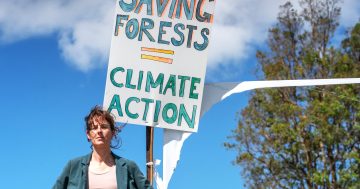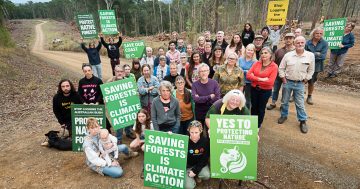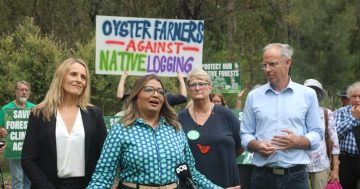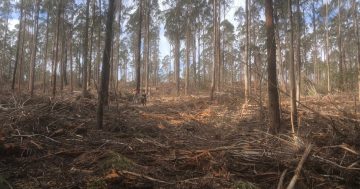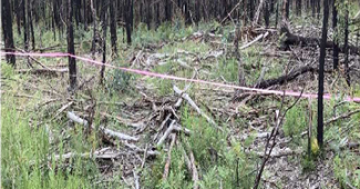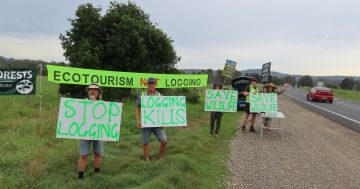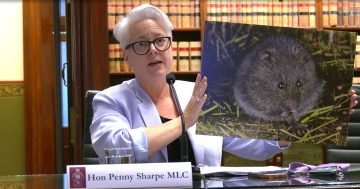
Heavy logging equipment was used to fight the 2019-2020 bushfires in the southeast of NSW. Photo: Brett Robin.
The recent announcement by the Victorian Government that nature forest logging would cease by 1 January 2024 has concerned not only Victorian communities, but also neighbours on the NSW side of the border.
The logging cessation has been brought forward by six years, catching communities unawares.
Vic Forest announced through a newsletter at the end of May they were “continuing to support the transition of the native timber industry while protecting as many jobs as possible”.
“Applications for Sawmill Voluntary Transition Packages will open in July 2023, with the first payments expected in September 2023. This will be modelled on the ‘Opt-out Scheme’,” the newsletter read.
“A boosted worker support package will include access to the free TAFE program to help retrain workers to get jobs in growing regional industries.
“Harvest and haulage workers will be offered alternative work in forest and land management, enabling them to continue to work in the forests they know so well and contribute to bushfire risk reduction.
“Long-term programs to support local economies to diversify into new and expanding industries are continuing, as is the assistance for timber businesses seeking to transition from reliance on native timber to plantation fibre.”
For Victorian timber towns, the announcement has provoked disbelief and dismay. Workers and communities have rallied to protest the decision which they believe not only threatens jobs, but also the towns and communities themselves.
The East Gippsland Shire Council has decried the announcement, with Mayor Mark Reeves claiming the full closure of the industry by the end of this year, coupled with a mere $200 million statewide package to support workers and communities who underpin an industry that contributes $1.4 billion annually to Victoria, will have lasting impacts across the shire.
“This decision tears at the fabric of our communities. The unrealistic change in timeframe means the impacts will be felt immediately and continue for years to come,” Cr Reeves said.
Cr Reeves said the Government’s decision did not fully consider the implications for East Gippsland communities and the need for an ongoing supply of in-demand forest products.
“It completely flips East Gippsland upside down and does so without a logical explanation or a plan for the future,” Cr Reeves said.
His council had a position paper on native forest logging and has strongly advocated for a high quality, low volume native timber harvesting industry where communities can continue to thrive, forests have multiple uses, biodiversity is protected, and where harvested timber is used for the highest value purposes.
On the NSW side of the border, concerns have also been raised, not only for the possible loss of jobs and businesses, but also for the important support the logging industry has been able to provide in bushfire mitigation.
Secretary of the South East Forest Association, Peter Rutherford, is highly critical of the cessation decision.
Mr Rutherford has been involved in the timber industry for more than 40 years and is a supporter of sustainable native logging practices.
He is concerned about the social impact the cessation will have on timber workers, but also fears for the future possibility of severe bushfires.
He has firsthand experience with bushfires, including those in 2003 and 2019/20.
He believes the heavy equipment used in logging is also a vital tool in fighting bushfires and he says once the loggers go, so will that equipment.
He believes stopping sustainable logging will impact native forest biodiversity and the risk of bushfires will increase.
He said logging was not a big threat to the ecology but uncontrollable bushfires were.
Mr Rutherford said if hardwood logging ceased in Australia, this wood would need to be imported.
This, he said, was a direct threat to wildlife in those countries where habitat is being lost at a rapid rate.
Like the residents of Victoria’s timber towns, Mr Rutherford supports renewable and sustainable planting to sustain a native timber industry and also mitigate the threat of catastrophic bushfires like those experienced three years ago.
The Victorian Government advised when delivering the budget it would have 30 crews available for fire and land management but provided little other detail.
It advised harvest and haulage workers would be offered alternative work in forest and land management, “enabling them to continue to work in the forests they know so well and contribute to bushfire risk reduction”.
A report in the 7 June edition of TimberBiz* quoted Australian Forest Contractors Association general manager Carlie Porteous as saying “the lack of a detailed strategy left crews in limbo and threatened future capacity to fight major bushfires.
“There’s just not the work of 30 crews,” Ms Porteous said.
“What are they supposed to do for the rest of the year (outside the fire season)? Basically, are they going to be lawn mowers with really expensive machinery?”
She said contractors held significant debt and would need long-term agreements to remain on standby.
TimberBiz further reported, “During the 2019-20 fire season, Forest Fire Management Victoria called on 34 contractors and their 284 workers to use 190 pieces of machinery, from bulldozers to excavators, to fight the Black Summer fires, build emergency fuel breaks and clear roads of fallen timber and dangerous standing trees.”
*Ryan Media produces the forest and timber industry’s longest-running magazines, Australian Forests & Timber News and Australasian Timber Magazine. It also publishes Australian Forests & Timber Directory ONLINE.








